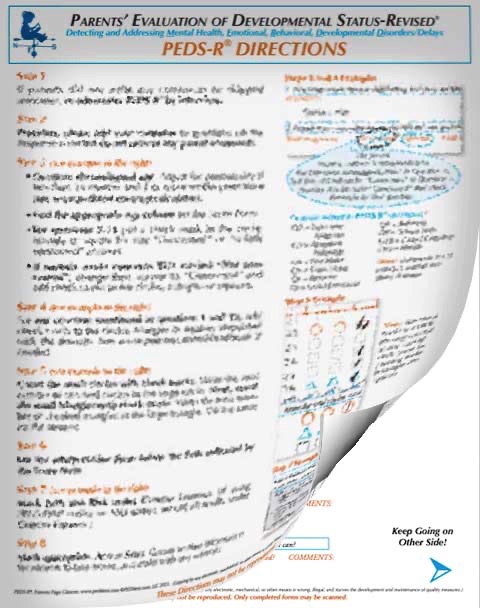PEDS-R® and PEDS:DM® translations comply with the International Test Commission Guidelines for Translating and Adapting Tests.
We recommend that users of PEDS Tools® adhere to The National Culturally and Linguistically Appropriate Services (CLAS) Standards in Health and Health Care in order to “provide effective, equitable, understandable and respectful quality care and services that are responsive to diverse cultural health beliefs and practices, preferred languages, health literacy and other communication needs.
PEDS Tools® enjoy complete cultural translations. Translators are usually bilingual health care providers who are required to create and then try out a new translation with families and staff. For widely spoken languages for which there are many dialects, translation teams are formed. For example, Spanish is the most widely understood language in the world but there are many different types of Spanish. For this reason, Argentineans, Mexicans, Chileans, Spaniards, Guatemalans and American-Spanish speakers were included in the translation team (23 clinicians in total!) --with the goal of creating, where ever possible, a single translation that works well for all. With some seemingly related languages, a unified translation is not possible (e.g., Portuguese versus Cape Verdean)

PEDS-R® is printed in English and Spanish. Order print copies of these translations at The PEDStest Shop.
For users of PEDS-R® in print, we license translations separately. Please contact us for more information.
If using PEDS Online®, a web-based screening service, presents PEDS-R®, PEDS:DM® and the M-CHAT-R in English and Spanish. Digital files of PEDS-R® Response Form in all the above languages are provided as part of the license agreement. To learn more about PEDS Online®, trial the online screening service.
If using PEDS:Developmental Milestones® (PEDS:DM®) in print, this measure can be purchased in English and/or Spanish. You can order printed materials at The PEDStest Shop. We also license translations in Arabic, Chinese, French Canadian, Japanese, Korean, Punjabi, Swahili, Taiwanese, Tamil, and Thai, with other languages in progress. For licensing PEDS:DM® translations please contact us with your needs.
If using PEDS Online®, English and Spanish are shown on the site. Digital files of all translations for the PEDS:DM® (as well as PEDS-R®) are provided as part of the license agreement. To learn more about PEDS Online®, trial the online screening service.
We encourage you to read our recent textbook, Glascoe FP, Marks KP, Poon JK, Macias MM (eds). “Identifying and Addressing Developmental-Behavioral Problems: A Practical Guide for Medical and Non-Medical Professionals, Trainees, Researchers and Advocates.” Also available as an e-book, which covers: